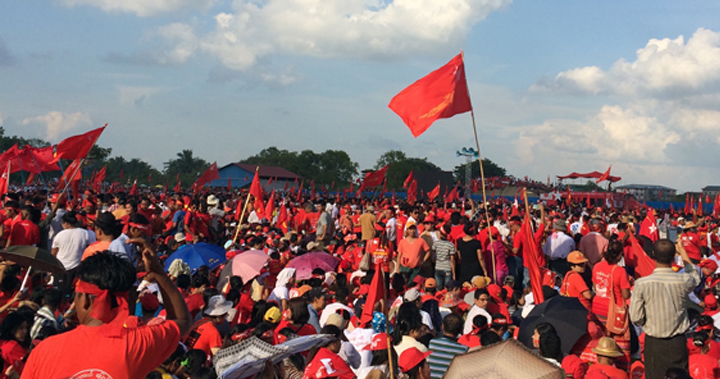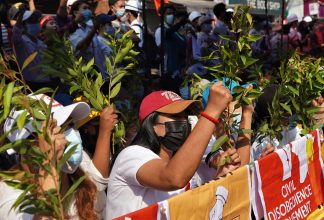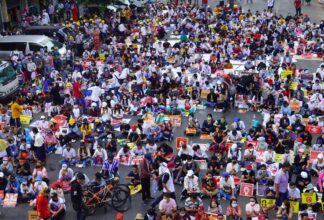Recommendations Regarding State Counsellor Daw Aung San Suu Kyi’s Visit to Sweden

Since the National League of Democracy (NLD) took office in Myanmar in 2016 the new administration has failed to carry out significant reform. We recognise the continued domination by the military, but the new government’s ability and willingness to improve the human rights situation is deeply disappointing.
In Rakhine State, the Rohingya minority continues to face state-sponsored abuse the UN says may constitute crimes against humanity, heightened after a serious escalation of violence in October 2016. Credible reports of serious abuses by security forces have emerged, including extrajudicial killings, rape and other forms of sexual violence, torture and mistreatment, arbitrary arrest, and arson. Access to Northern Rakhine State remains restricted, including for humanitarian agencies supplying food and healthcare to a population that is almost wholly reliant on it for their very survival. The government puts its hope in the Kofi Annan Advisory Commission on Rakhine state. We welcome the commission however, it has no mandate to investigate human rights abuses. The government must take responsibility for and fully cooperate with the UN-Mandated Fact-Finding Mission.
Although the 21st Century Panglong Conference is slated as an opportunity to achieve nationwide peace, state sponsored violence and persecution continues in Kachin and Northern Shan State and poses a serious threat to the achievement of national peace and reconciliation. The government must do all it can to push for an end to military impunity. As offences continue, the space for humanitarian agencies to deliver necessary goods is also disrupted and access to the internally displaced heavily restricted.
Restrictions on freedom of expression and censorship remain of deep concern, creating a toxic environment in which speech in defense of the vulnerable is deterred, contributing to rising forms of intolerance and a shrinking space for human rights defenders. Cases of censorship have exponentially increased under the new administration. Laws governing electronic communication including Sec 66(d) of the Telecommunications Act are now frequently being used to criminalise legitimate speech. Over 50 individuals have been charged under this provision, among them those who are accused of “defaming” both State Counsellor Daw Aung San Suu Kyi and President U Htin Kyaw. The Unlawful Associations Act continues to be used to crack down on legitimate assembly and peaceful protest. Charges must be dropped against those facing trial for political reasons and political prisoners released.
Recommendations
- On the Situation in Northern Rakhine State and Protection for the Rohingya:
- Urge the State Counsellor to ensure full and unfettered access to Northern Rakhine State, including for humanitarian agencies, civil society and human rights groups, and journalists;
- Urge the State Counsellor to cooperate fully with the United Nations Fact Finding Mission, including by allowing unimpeded access to requested areas and ensuring that those who cooperate with the Mission are protected from reprisal;
- Urge the State Counsellor to take effective measures to prevent and respond to all forms of sexual violence in conflict;
- Push the State Counsellor to remove all restrictions on freedom of movement for the Rohingya that has led to adverse impact on basic livelihood including health and education;
- Push the State Counsellor to ensure equal access to citizenship for the Rohingya and amend the 1982 Citizenship Law.
On State sponsored violence in ethnic minority areas:
- Urge the State Counsellor to cooperate fully with the United Nations Fact Finding Mission, including by allowing unimpeded access to requested areas and ensuring that those who cooperate with the Mission are protected from reprisal;
- Urge the State Counsellor to allow full and unfettered access to humanitarian aid organisations to all internally displaced persons in need of humanitarian assistance;
- Urge the State Counsellor to take effective measures to prevent and respond to all forms of sexual violence in conflict;
- Urge the State Counsellor that peace cannot prevail, without the participation and support of all Ethnic Armed Organisations, both signatories and non-signatories to the Nationwide Ceasefire Agreement;
- Urge the State Counsellor to increase women’s involvement at all levels of the peace process;
- Urge the State Counsellor to keep pushing for constitutional reform. The success of the peace process is inextricably linked to the amendment of the military-drafted 2008 Constitution, a document that the NLD election campaign vowed to change.
On Freedom of Speech and Protection for Human Rights Defenders:
- Urge the release of all political prisoners and drop all charges against those facing politically motivated charges;
- Urge the reform and prompt repeal of laws that are used to persecute human rights defenders and others critical of both the government and military, including 66(d) of the Telecommunications Act, the Penal Code and other repressive legislation used to fuel politically motivated arrest and detention;
- Urge the State Counsellor to sign and ratify the International Covenant on Civil and Political Rights (ICCPR)
- Urge the tangible reform of the Myanmar National Human Rights Commission and ensure that its mandate is aligned with the UN Paris Principles including maintaining a genuinely independent composition. Urge the Commission to actively investigate human rights abuses rather than being an awareness raising body.
Signatories
Martin Gemzell, Asia Programme Director, Civil Rights Defenders
Kristina Jelmin, Operations Manager, The Swedish Burma Committee
Anna Sundström, Secretary General, Olof Palme International Center

